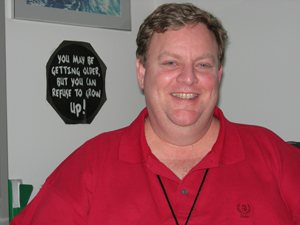Meet the IBEX Team: Tim Perry

Tim Perry, Operations Lead for the IBEX mission, grew up in southern California. "When I was young, I didn't have a clue about what I wanted to do. The only thing that interested me was photography. In 1977, I graduated from El Dorado High School in Placentia, California. After attending community college for a year and experiencing some heated discussions with my teachers, I joined the Army and spent three great years in Wurzburg, Germany, mostly traveling around supporting remote sites and listening to cuckoo birds when on maneuvers. I found my niche when I reenlisted in the Army and learned to be a satellite station repairman. It was then that I finally found something that I wanted to do for a career! The final section of the school was a 3-week course in controlling geosynchronous satellites. Thanks to this knowledge, over the years I have gotten the chance to work on a few satellites with some very nice cameras on them." Tim's photography interest has crept skyward, and several of the satellites that he has worked on have very recognizable names: Landsat 4, Landsat 5, and the Hubble Space Telescope, to name a few. "When I was in school, it would have been nice to know about the Nimbus and Landsat programs. The amount of information and science gained from these programs is incredible. It probably would have given me more of a focus in school." Tim has also worked on Microlab and Seastar Orbview3, both Earth-observing satellites, and now IBEX. Tim jokes, "We won't mention the launch failures."
Currently, Tim is responsible for the daily operation of IBEX. He coordinates the upgrades of the mission planning system and the spacecraft command and control software. He also coordinates and performs any additional testing that is required for command and control through the NASA network of spacecraft ground tracking stations. Tim says, "Now that we are in the period of routine operations of IBEX, my time is divided between IBEX, which launched in late 2008, and the Glory mission, which launches later in 2009. The best part of my job is sitting at the command console during a 'pass', when the spacecraft sends information to and receives information from Earth. I love all aspects of this part of the mission - sending commands to the spacecraft, reacting to contingencies and working with the ground tracking stations, running a procedure that I know will take all of the support that we have available, and finishing everything with a minute or two to spare. The ability to control a spacecraft is a great feeling.
"Over the years I have also taken a few programming classes. This has paid off when there was a spacecraft problem. We would go to the programming code and try to figure out what was going on. A lot of my experience came from senior controllers that passed on the tricks of the trade."
Tim has straightforward advice to future spacecraft wranglers, "First of all, stay in school and get your degree! Then spend a year or two working as a spacecraft systems engineer or controller. The time you spend doing the daily grind will make you a better engineer in the long run."
Tim's interests reach far beyond hands-on control of an orbiting spacecraft. "My son and I love to spend time together. We like target shooting, and we occasionally go to classic car drive-ins together. It is really cool to see the old muscle cars and listen to them when they fire them up. He and I both own Ford Mustangs, so we alternate driving to the car shows together. We have an ongoing debate about who has the nicer car - I do, of course! I have also been learning guitar off and on for the last couple of years. I now have a greater appreciation for what Chet Atkins and Les Paul were trying to do. My son plays classical guitar extremely well and he teaches guitar lessons. I often joke with my guitar teacher that I actually have two teachers. But that can be a good thing!"
The future of space exploration, in Tim's opinion, is in the small satellite programs. "The day of large orbiting platforms is behind us," says Tim. "They are costly and the spacecraft has to be a shared resource. Small satellites like IBEX give the science teams a greater amount of viewing time for a reasonable budget."
"IBEX is a wonderful program with a lot of potential. We have a great team, even though we don't always see eye to eye on everything. At the end of the day we do get it worked out. Working on a science program, reading the papers that get published as the program progresses, and knowing that I was part of something good that made a difference in this world are incredible experiences. I really enjoy flight operations. As long as Orbital keeps on building satellites, there will be a need for someone to control them. I plan on doing this until I retire."